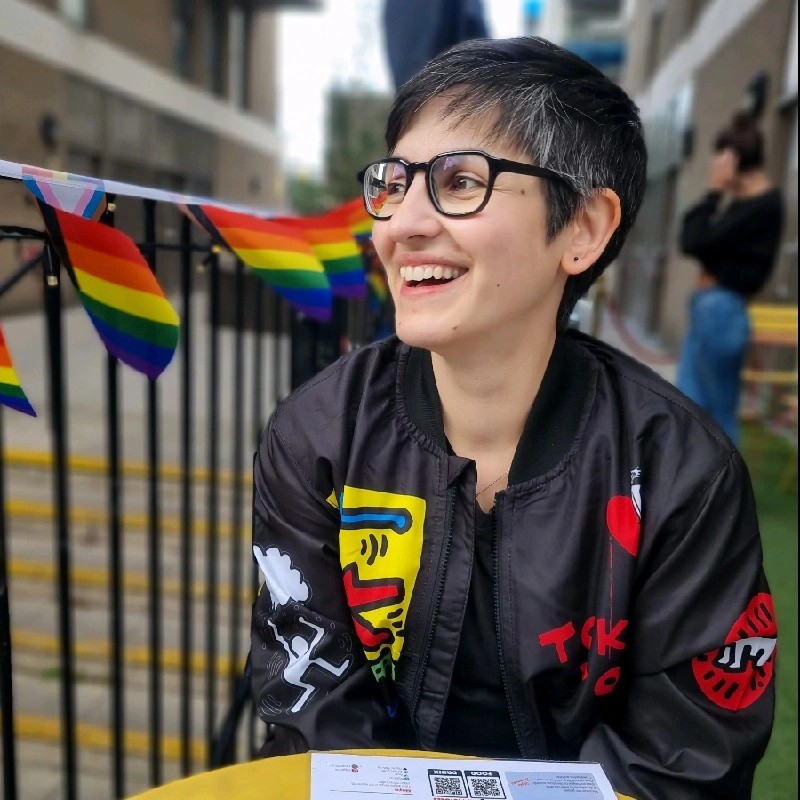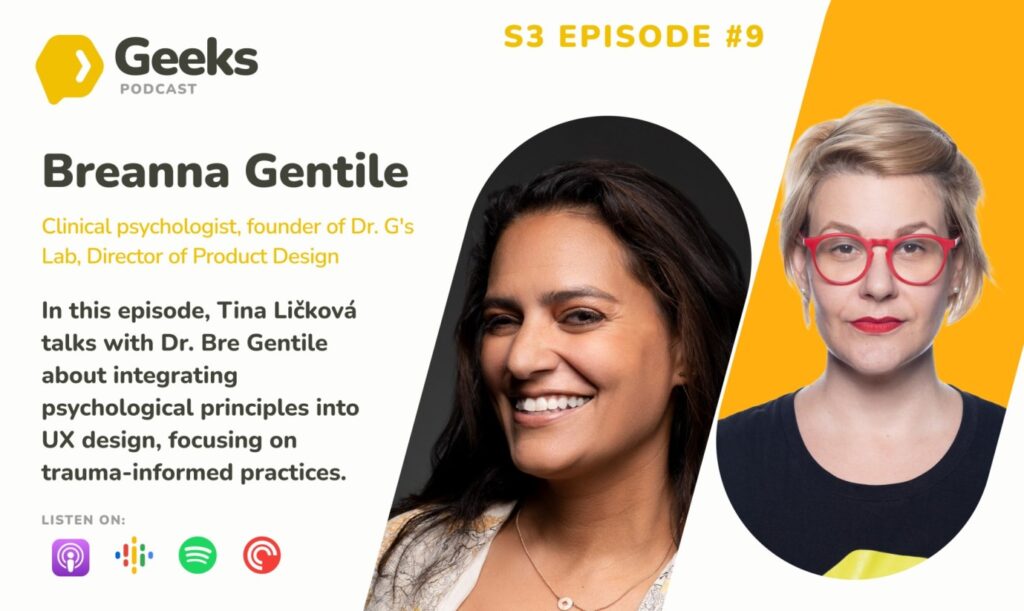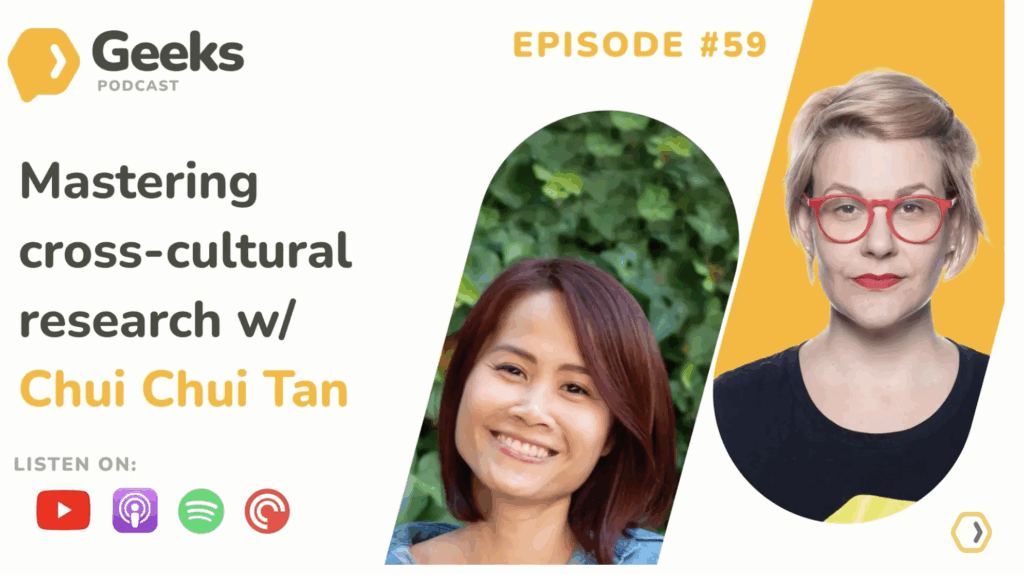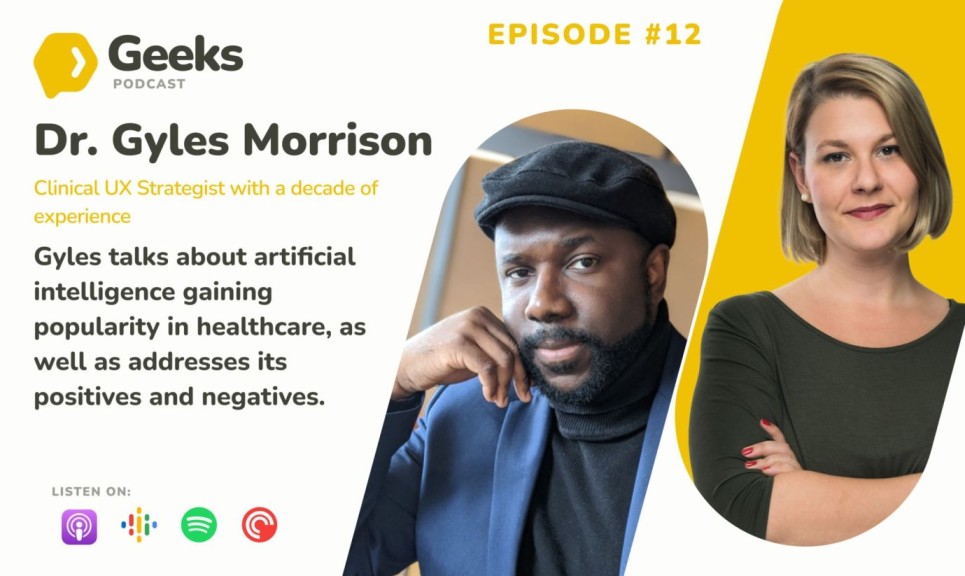Episode highlights
00:01:47 Transition into UX Research
00:04:43 Cultural Sensitivity in Research and Team Management
00:14:00 Verbal and Non-Verbal Communication in Different Cultures
00:20:41 Challenges of Vocabulary in Multicultural Environments
00:29:51 Political Correctness and Communication
00:33:37 Where to Find Maria
About our guest Maria Panagiotidi
Maria is a mixed methods UX researcher with a strong background in Cognitive Psychology and Cyberpsychology.. She holds a PhD in Psychology and spent over 5 years as a lecturer before transitioning fully into UX research. Maria frequently shares her insights on the intersection of psychology and UX through different platforms. She enjoys working in distributed and multicultural companies and has experience building UX Research teams from scratch. In her free time, she enjoys street photography, speciality coffee, playing tennis, and life at home with her partner and pets. There are multiple ways of getting in touch with Maria. She runs a blog named UX Psychology, which you can find on Substack, where she delves into a variety of research topics, cultural contexts, and stereotypes. For those who are active on LinkedIn, she shares professional insights and articles there as well. For more in-depth insights, you can listen to her podcast, The UX Guide to Galaxy, which she co-hosts with her friends. Maria is also active on Twitter, providing another channel to engage with her on UX-related topics.
Podcast transcript
[00:00:00] Tina Ličková:
Welcome to UX Research Geeks, where we geek out with researchers from all around the world on topics they are passionate about. I’m your host Tina Ličková, a researcher and a strategist, and this podcast is brought to you by UXtweak, an all-in-one UX research tool.
Hello Geeks, this is the third episode of the third season and we talk to Maria. Maria is a head of Research at Oyster. She’s probably one of my favorite people from the business. In this episode, we were looking again into cultural sensitivity and we were looking quite into a deep level, I would say, for those 35 minutes available.
And we were looking not only into making or conducting research with users, but also into hiring of researchers’ generations and the differences that they might be there or might not. political correctness in different cultural contexts and stereotypes. Please don’t forget to follow Maria’s blog, UX Psychology.
And if you’re really interested, she has a great small podcast called The UX Guide to Galaxy with her two friends, which is definitely worth a listen.
I just received another blog post from your beautiful blog. And I know it’s about participant recruiting right now, which is a little bit playing into what we are going to talk about, but maybe explain to me more. I know you’re little, but for the audience, who are you, what do you do and why do you write this very beautiful blog?
[00:01:47] Maria Panagiotidi: Yeah, so who am I? That’s a philosophical question. I am at the moment head of UX research at a company called Oyster. And Oyster is a company that helps other companies. It’s a fully distributed place, which that’s why we’re going to talk about culture today. It’s a fully distributed company with people from over, I think, 60 plus countries at the moment.
So that’s quite a diverse team. And I’m also working part time at a new startup called Crowdsurf, it’s based in the UK and we’re developing a new live streaming app. So I do, I’ve been busy. And the reason, my background is, I keep forgetting to talk about this, yes, my background is in psychology. I have a PhD in cognitive psychology.
Before I decided to go full time into UX, I was a lecturer in cognitive psychology and cyber psychology. So I was very interested in human computer interaction and how cognitive psychology comes into play. And yeah, I was teaching about UX and at some point I realized actually I’d rather just do that full time than do the, be in academia.
I wanted to do something that has more impact and yeah, so that’s it. But as you probably know, if you are an academic or you have some experience doing that, you get the bug is really difficult to get rid of it. So I like writing and sharing and talking. So the blog was an outlet for that. Before I started the Substack, I had other… I’ve tried blogging and lots of things in the past, like I think I remember using WordPress and what was blogger back in the day to, so it was usually topics related to psychology and applied psychology because that’s my passion trying to make the academic and all those dry things to turn them into something actionable.
And it’s something that I try to do in my job as well as the blog. And that’s how the blog was created.
[00:03:37] Tina Ličková: Yeah. So very much recommended for the audience is to find your blog, we will also linked it because it’s really nice, really good topics and you go really deep. I don’t know if I remember right, but the one before was on onboarding, right?
Where you, yeah, different approaches and how to approach onboarding on its own. Very applied, I would say.
[00:03:57] Maria Panagiotidi: Yeah. I went through different kind of findings from psychology and theories and how you can use them when you design an app on boarding or on boarding experience. I hope that’s helpful for you.
[00:04:08] Tina Ličková: I will definitely use it. But you were mentioning, and this is where we, when we were brainstorming last time, agreed that this could be very interesting, that you work at Oyster, which is a distributed company through 60 countries. And you have a team of people who have come from different backgrounds. And this is something I’m super interested in because also in our podcast, we are trying to give space to people from all around the world.
We are not yet successful as I would wish, but getting there. So what is your experience from working in such a multicultural company? Big question.
[00:04:43] Maria Panagiotidi: Yeah, that’s a good question. First, I need to clarify that I live in the UK. I live in a place called Sheffield. It’s quite a green city, one of the greenest in Europe, but I’m from Greece.
So to, to begin with, I’m already multicultural. I’m in a place where I don’t really know what my identity is, I’d just say European. And Oyster is full of people, half of Oyster is people like me that were born in one place and moved around and they end up in a very different country. And others, they do raise them, they’re living and working in the same place that they were born.
And in the past, I had experienced multicultural environments. But I was always in the UK and they were in the UK. So it was people that had left their own culture and moved to this one. They tried to adapt. So I was in a bit of a shock when I started at Oyster. I was aware of having this experience of multicultural context, but being in a place where you’re working with people that have never, they’ve never been in another place apart from their own hometown.
And they don’t have the same exposure as you in the British culture or European culture, even. That was a bit of a shock and it took me time to adapt. I remember having some meetings and going along with like my expectations and having this agenda, doing things my own way because I was used to everybody doing it the same way in companies in the UK, even when people were from different places.
So that was something I had to learn. And it was part of the, I think that part of the onboarding experience, there were a few things about culture, but nothing very deep into it. And I had to learn by doing because there were a few misunderstandings or meetings where I felt that what I said might have been offensive to the other person or so that was a wake up call for me and I realized, okay, actually I need to take a break and I need to read up on this and find out more about how I can collaborate with my own team.
And then the second step for me was that our users are the same. So Oyster has people in a very similar to the people that work at Oyster and it was realizing that actually we need to have a similar approach when we do interviews, when we do research, because their culture plays a huge role in everything. Like the way that we understand the world, the way we interact, the way we communicate. Yeah, that was a big thing for me. At the time, and I’m still learning. I haven’t found a solution or a perfect system to solve this problem, but I think that the first step is like being aware that this is a thing, that there are differences.
And when you work in a distributed environment or you’re working with users that are based in different places, that can be a problem. It’s something you need to think about before you do anything, before you start planning your research. Or you start planning your meetings with your colleagues, you need to have a look.
One thing that’s really useful here for Oyster is that we have profiles. So that’s something that can help. Its employee has a profile in which they share information about themselves, as well as the preferred working styles, things to know about them. And that is a very good starting point. I’ll start it before it’s meeting, going to this place, checking, and some things have to do with culture, others, because culture is one thing, but also individual differences come into play when it comes to work.
And yeah, so using this as a guideline, before you even schedule a meeting with somebody, check. Do they like communicating asynchronously? Do you need to give them a heads up before you book a meeting? What time can you book a meeting? What’s, do they need structure and agenda? Because some cultures and some people need more structure than others.
Others like ambiguity. So by, by looking at this profile helped me loads. And I think if you work in a team that’s multicultural, consider doing something similar, just give people a way to express themselves and be open to each other about who they are and how they like to work with each other.
[00:08:19] Tina Ličková: This reminds me of, it’s a little bit visible in Vitaly Friedman was sharing it recently as well, this page of how to work with me, which is great because you already know, okay, this could be the triggers. This could be, and it’s not tied to any kind of culture. It’s okay, this is me. And this is what sets me up. And this is what energized me. This is what kills me, whatever. Really interesting. And there are two. Levels. One is the team level. One is the user level. And I will go to the user level a little bit later because I’m super interested in hiring researchers.
I can imagine that’s like wild when it comes to expectations, situations, they’re coming from styles, they lead research as well. Do we have, there is methodology. So can you tell me more about that?
[00:09:06] Maria Panagiotidi: Yeah, so the hiring, that was another shock in the past that had been hiring manager and part of hiring panels with companies.
Again, we, I remember interviewing candidates from different countries, different backgrounds, but as I said, it was always based in one place. So we all lived in the same country. So that wasn’t, they’re pretty much people try to adapt. So they hide some of those differences or they learn how to behave in a way that’s expected.
But that wasn’t the case with Oyster. And it starts from the first step of the hiring process of meeting their CVs and their applications. For example, I don’t know, I don’t know how things are with you are, but in the UK, you’re not allowed to have a picture. Or personal information in your marriage status in your application, your CV, while in other countries, people have pictures, they tell you about their children, they tell you about everything about themselves.
Which you can’t do it here because it would go against privacy laws and discrimination policies and so on. So that was the first thing for me, seeing the CVs by applicants and seeing all this information and feeling like something was terribly wrong because I’m aware of the biases that come into place when you see someone speak.
And it continues from that to the way that people write, whether they write cover letters or not. I think in some places now people have stopped doing that and now there is a do. The interview practice as well. In certain places, candidates are more casual and informal in the interviews and in others, they’re very formal.
So we had, for example, interviewing someone from the US, casually dressed, and it was somebody from India. She was all prepared, like all professionals. So you need to adapt to that and as well, because they see if you’re the interviewer and you’re casually dressed, and you’re interviewing somebody from a place where they expect the interview to be more formal, you have to be responsive to that either communicate openly during the interview itself or prepare the candidate in advance about what to expect. There’s some in the communication style as well as we know there’s lots of research showing that culture affects how people communicate and in some places you get more, you get much more context and you have the high and the low context cultures and in some cultures rely heavily on nonverbal cues.
For example, China, but then you’ve got places like the U. S. where people need a lot of detail and they have to articulate pretty much everything. So that’s something that happens a lot. Again, during the interviews, you have to, which is why you have to be mindful of what, where’s the, where does the UX research I’m going to be doing coming from? What’s the background? What’s their experience? And be able to read between the lines during an interview. And that also affects the way you communicate towards them, the way you ask questions, and the way yeah. It’s, it pretty much affects the whole process. And beyond that, because there’s no specific to the UX researcher, it can affect, as you said, the way that people do research as well.
For example, being from Greece, I come from a culture that likes, clears real rules and structure and unfortunately I can say that I have that, I’m not a big fan of ambiguity, which affects the way I do research. I do know in advance, try to work out what can go wrong, have a plan, have a detailed plan.
People from other cultures, however, don’t have that. And they might have a plan, but it might not be as detailed. And then when you work within a team with people from various countries and research different culture, that actually can become quite apparent in the way that you work, in the way you prepare for a research study and the way you communicate your findings and so on.
Yeah, even communicating findings. can be affected by this, whether you prefer to, things like humility, for example. We had a conversation with one of our newer researchers, Sophia, who’s a senior UX researcher from Portugal, but she’s also worked with loads of multicultural teams. And we’re saying that researchers from Europe would be very careful.
And quite, they have high humility, so they wouldn’t really brag about the impact of the research because that’s the culture aspect there, but research from the US would probably in some case do the opposite and they would brag about how impactful their research is. That’s one example. Yeah.
[00:13:16] Tina Ličková: The selling is definitely because I already, for example, see, I was born in Czechoslovakia, which is not a country existing anymore.
So it’s Slovakia and the Czech Republic. And we already say there in that case, like the Czechs can sell themselves better, but in comparison to Americans or other cultures with the like self marketing, whereas way larger, it’s difference as well, but you were mentioning. Two points, which I’m super interested in, low and high context.
If you could maybe explain it with your own words. I can maybe then add some story. And when it comes to the structure, this is where I’m super interesting because that goes into like how you prepare research. Then it goes to communicating findings. Maybe we can go deeper there.
[00:14:00] Maria Panagiotidi: This is more to do with using verbal and non-verbal communication, as in, in the interactions with each other.
So in some cultures, people use a lot non verbal communications, and for example, there might be Now they ain’t doing gestures, gesturing a lot, and many things are between the lines, so you don’t actually say everything, you don’t have to spell everything out, people assume and make their own interpretations of things.
In other cultures, people are very direct, and they pretty much, all the information they have to tell you. These communicate into you directly, there’s no subtext. And for example, that’s one culture that does that is the US. And we do see that in the way the American people usually communicate and tend to tell you everything that on the other hand, you’ve got British people that have a lot of the nonverbal communication happening in comparison.
And that’s something I’ve experienced in with mostly with colleagues, not so much with research, because I think sometimes when you have users, people are aware of the, of what’s happening and also having remote interviews changes dynamics I think a bit because people, when they’re communicating remotely, they sometimes adapt to that and nonverbal cues are often missed anyway.
So people try to be. That’s more expressive.
[00:15:15] Tina Ličková: And it’s interesting that you’re going into the direction nonverbal verbal, because for me, the high and low context is mostly complicated in the verbal level where we’re mentioning Britain’s where something means something for them. And when they say, Oh, this is interesting.
It can also mean that this is really not good. Just try to make it better. Yeah. I live in the last five years in German speaking countries. And I lived for three and a half years in Germany, and now I am two years plus something in Austria. And already there, you can see the differences, especially in email communication.
Germany is like direct, very short on words, very to the point. And when it comes to the Austrian one, I sometimes really have to go into the translator and try to figure out what they are trying to say? What is my action to take on it? So this is where I’m struggling the most. And if it’s happening in a conversation.
Then I am sometimes like, okay, are you trying to tell me something and I just don’t know? And this brings me to another question. Do you see any benefits of not knowing the culture of the person on the other side and being able to explore it on, on, in that situation right away?
[00:16:31] Maria Panagiotidi: One benefit I can see is that Actually, knowing can lead to stereotyping, and sometimes when you think you can make assumptions based on what you think, but if you don’t have that context, you can just try to find out by asking the person.
And I think sometimes I was like one of the solutions and the ways to improve the way we do research with multiculturalism is actually like open communication and being clear about what we’re doing. So not having this, all these frequent assumptions about the other person can actually help you to learn more about them without projecting what you’re already thinking.
Because each person, we might be affected by culture, but that’s not all we are. Culture is one small part of a person. There’s much more, individual differences are much bigger. So it is just being aware that there might be some cultures without knowing what they are. is a good first step and you just have to ask and be open and honest and sometimes a bit vulnerable like explaining if you for example if you have an interview with with somebody and you do sometimes when you have a difficult interview and the other person doesn’t open up and you can’t figure out why that’s happening sometimes being honest and just maybe Talking a bit about the culture of your background or the background might be something that could help.
And if it’s a, if it’s a user from a different country that you’re not familiar with, for example, you can start like bringing this up and try to understand their context during this conversation.
[00:17:54] Tina Ličková: Interesting. And you, we are already in the space of user research and you are already pointing out something that we are together, or not together, but named as a cultural sensitive research. So what would be your, I don’t know, structure or advice on how to be, how to lead the research study in a culturally sensitive way, how to prepare for it?
[00:18:17] Maria Panagiotidi: Yeah, that’s, I guess it’s a good question. As I said, I think that the first step is just be aware. That this is a thing that there is, culture does play a role.
And if you’re, if you have users, check who your users are, where they’re based. And if you have a product or a service that is used by people from many different places. You need to have a sample, first of all, find a way to include people from as many, as many places as you can in your research. So make sure that you give people a voice.
I think that’s knowing that the cultural differences exist, and then giving people a voice is the second step. That can be quite tricky, saying that, because… There are other things that come into play with the cultural differences, such as time zones, language barriers, it’s more, more boring, the incentives, sometimes you might not be able to offer incentives to participants or the country.
So you might have to find another way because there are lots of issues that you have to overcome to be able to give those people the voice. And then. Reading, always read it’s not just about culture, just reading is something all UX professionals should be doing. We should be learning constantly.
Try to read about different cultures, try to understand how other people think, and even the politics in different parts of the world. That helps you to get an understanding of your users and what they’re experiencing because nobody exists in a vacuum, right? And if you’re working in a company that has people from other places and a distributed company, talk to them as well.
Like talking to your colleagues and understanding their perspective can also be beneficial when you’re doing the research. It enables you to be more sensitive, more culturally sensitive in that. And when it comes to the research itself, using plain, inclusive language is very important, especially when language can be a concern as well.
And make sure that the terminology you use makes sense. So that’s, I have a recent example with this from Oyster. We were using certain HR words with many people being either British or American, or having a lot of experience in those cultures. Actually, we had assumed that everybody knew and everybody thought that we meant, like when we used the term, that’s what it meant.
I can’t really tell you more because of the..
[00:20:40] Tina Ličková: Yeah, because of the NDA.
[00:20:41] Maria Panagiotidi: Yeah, exactly. But there were specific words that Yeah, we were using in the platform. We using, we were communicating with our users and we’re realizing the study, but actually, oops. Some people in some countries think of something completely different when they hear that term.
And that was, yeah, again, it’s something, so make sure that the terms that you use in your survey or your interview mean what you think they do for people from those places. So maybe start with, if you’re doing an interview, Start with asking people what’s the thing when they hear a specific word or define the terms that you’re using.
It’s something really simple, but it can make a huge difference. Because if you don’t, you might end up with very strange results and confusion.
[00:21:20] Tina Ličková: That’s a good one. We work a lot. We talk about work a lot. It’s a part of our personality. What do we do? But the relationships to work is different culture from culture.
Again, U.S. and British culture is very different from continental Europe or Asia. Can you maybe, I am there a little bit trying to geek out right now. Can you maybe say there, what do you see differences when it comes to culture? We are not saying that it’s something written in stone, but maybe what you are observing.
[00:21:51] Maria Panagiotidi: Yeah, there’s quite a lot of things that I was going to mention during the hiring beam, but I totally forgot because there are this like support life expectations, things like holiday. How you feel towards your people that are your seniors. That is very different depending on the place you’re from.
And when you try to create a culture in a distributed company, you try to make sure that everybody, you try to find a way that everybody feels similar because everybody is equal in a way that all your employees have similar rights. And that’s a huge challenge. I did notice that we had people who send places.
At Oyster we’re very flexible. If you have to go to the dentist for two hours in the morning. You can go, you don’t need to ask anybody, just say I’m not available this time. For many people, that was a struggle. The idea that you don’t work nine to five. You don’t have to ask somebody. You don’t need to get permission from your supervisor to do that.
The expectations about how long you’re supposed to work as well. And when it’s the same across cultures and the company that can create a lot of issues, especially from cultures that are not used to having this kind of freedom. So the. We have quite a few people from Spain and Greece and South America where that’s not very common.
Usually they have somebody checking what they do and they’re supposed to produce a certain amount of work. Yeah, so that’s something that I’ve come across a lot and at Oyster.
[00:23:13] Tina Ličková: Of course, I can feel it on my own bed, especially when you are talking about your relationship to management here, his authorities, it’s a very different form of post communist block than in a democratic country for a longer time.
You were also mentioning politics and when it comes to politics, one of the questions I’m super interested in is what differences in generations, because that’s also a little bit of a different culture.
[00:23:38] Maria Panagiotidi: Oh, generations is a weird one because generations seem to be different to many other cultures. Generations, because it’s something that personally as well I’ve noticed that in certain countries, the generations that have been a few years behind the American generations that we have in mind because technology doesn’t, it didn’t progress the same rates in all parts of the world. So the whole idea of generation is a bit faulty and it needs to be considered with other things in mind, but there are things we can do, like to do, for example, checking how much people know about technology.
If you work in a tech company, have a product, I don’t assume that somebody is going to be tech savvy or not because of their generation, their belonging, but yeah, I have mixed, mixed feelings about it because it’s not the. There’s not much clear research, like suggesting that the findings apply to everybody.
I don’t know if that makes sense. It’s just that marketing categorization is out of my interest, isn’t it?
[00:24:38] Tina Ličková: Yes, because why am I going in this direction, I’m happy that you’re saying it so openly. It’s so direct, because we are throwing it with these terms like millennials, generations that, and possibly, and I get it.
I get it. When I see the description of the millennial, I would say me and my friends are just ticking the boxes. I, for example, love Dr. Eliza Philby, who is British and she does her podcasts and her summaries in her very nice blog as well. And it’s just very different from my experiences as a woman in almost 40s.
To what she is describing, what is happening in Britain, because it’s a very different country from where I come from. And when she’s looking into generations of women, or I think she is also a piece of non-binary people, transgender people, and how they are in that generation, changing their circumstance and situations, it’s super different.
And it’s going back to politics. It’s going back to the whole world.
Yeah.
[00:25:36] Maria Panagiotidi: Yeah, I agree. I think that sometimes we do have to simplify things to do like mass analysis or to find patterns. But when it comes to, I don’t know, like I like getting an individualized kind of approach when it comes to research.
So you do. There are all those things, but it’s also the person and you need to focus and find what’s the context around this particular person and the generational stuff is. It might apply if you live in the U. S. or specific parts of the world where progress happened in a specific way. But I know that from Greece as well, like that things, generations that don’t make sense in the way that are defined for the U. S. for example, because of the radar technology politics as well, as you said, there’s, yeah, oversimplification. For example, saying we’re developing a product for Gen Z that doesn’t make sense Doesn’t say anything. Yeah. It doesn’t. It really doesn’t. It’s obvious it’s very U.S. centric, that kind of approach.
[00:26:36] Tina Ličková: And I get it because if you have cultural dominance in the world, we had it with Britain in the 19th century, most probably we had it with France and the other. We had it with Greek in ancient times. They weren’t just products developed for generations back then. But, and this is where I maybe want to not close, but go into a different topic, because when we were preparing, we were also very conscious of, we have to be careful with this topic.
So we don’t, are not offending, insulting anybody, not making way too much jokes because I am very well known and you probably have also some type of humor, which might be. Not welcome by others. And we are at this point in the world where, and this is something where the whole world is talking about it on different levels.
We are woke, and I think a researcher has to be woke because that’s something, I don’t know, you have to be awake and aware of things and topics in diversity and inclusion. On the other side, we are in the times of political correctness, which is even going to the direction of cancer culture. And my question to you would be, how do you deal, what will be your recipe? Not to be overly apologetic when making mistakes and how to learn from them?
[00:27:54] Maria Panagiotidi: That’s a really good question and it touches some sensitive topics there. It’s also a bit weird for me because I am part of lots of minority groups, like in terms of my identity. I think like a hint. Lots of, most of the boxes, but at the same time, I think like being open and honest and potential is sometimes fragile and like being able to show our vulnerability is important because we are all, we’re humans and we’re going to be making mistakes.
We might say something that could offence, it’s possible. And as we grow older, that becomes harder and harder because there’s so many things changing. And as I’m growing older, I start understanding. The older people, when there was a teenager, and there was, when you’re in your early 20s, and you see all these old people struggling to keep up with the times, I can start experiencing, it does become harder and harder.
Things change so dramatically from year to year. I’m sure I’m making lots of mistakes. I’m sure most of us are. And, but just being open about this, apologize, try to understand the other person. If you say something that might cause pain or make somebody uncomfortable. Being able to own it and actually question it, try to understand what’s behind that is, because we shouldn’t just get defensive.
I think that’s, I’m trying to do, not be defensive and try to be open to that, because that’s what ultimately leads to empathy, I think.
[00:29:10] Tina Ličková: You are saying a very important point, because I know, I think it’s also important or natural that in a certain point we are getting defensive, because When we do a mistake and somebody accuses of being really bad in any kind of, then the defense mechanism is very natural.
But I think even the recognizing like, Oh, I’m in defense mode. I’m, I am trying now to defend me and my whole life philosophy and then holding the space of this misunderstanding and be like, okay, pause, take a minute and maybe think about what was just said. I don’t think we are doing this very often, do we?
[00:29:51] Maria Panagiotidi: No. And I think the reason is, as you said, the whole, I don’t want to say the terms, it’s so scary now with this kind of culture, but sometimes you don’t get the chance to have a conversation. Like I’m aware of people that they might say one thing and they’re just being ostracized. So they don’t even get the chance to realize that they’re being defended and that can cause issues.
It does affect us as well in, I think in UX research, because we deal with humans and users and. That reminds me of, I’ve had experiences of quite a few users and interviews, not being politically correct. And in some of those cases, I found myself on the other side, and that’s where I had to do the same, I had to, because if somebody says something that offends you, that might not be appropriate for the culture you’re from, because that’s, again, culture and political correctness is, it’s not the same everywhere, for example, what you can say in Greece and get away with, and I had to do the same and have to stop myself from reacting and being to it.
Because when you’re interviewing somebody and you’re, you can’t really judge them or, but of course you do unconsciously we do, that’s, we’re humans. Yeah. And I had to pause and. And try to understand. And instead of making any judgments, I just try to ask all the questions, try to understand what they meant and what was the issue, why they made this specific comment.
But that’s really hard.
[00:31:12] Tina Ličková: I am very much thinking in the last couple of weeks about preparing some materials about why UX research is political and why we have to, because I’m stuff either from clients or users, which could be labeled as offensive. And I’m like, sometimes I’m in such a shock that I’m like, just quite, because I am able to express what is just going on in me. And sometimes I’m like, should I be saying something because. going to twist the conversation into very different directions. So this is the struggle that I see there as well. But thank you very much for your wise words.
Is there anything that you will be like, because I know you prepared hard for the episode where you’re thinking like, Tina, why didn’t you give me space for expressing this thought? And I want to say it.
[00:31:59] Maria Panagiotidi: I tried to think about it. What have I done or what I should be doing better as well like this? The great thing about this episode was it got me thinking about how can I do what I’m doing and how can we do what we do in my work better? How can we be more inclusive? And It was a bit of a way to reflect upon my own like practices and experience, but yeah, it was, I think the most important thing is the dangerous thing we’re talking about cultural differences and cultural sensitivity and this kind of research is the other stereotyping.
That’s something that I often struggle with. And that applies not just to culture, but also any kind of individual, any kind of differences that you can think of, or yeah, different groups of people. It’s easy when you try to understand them to end up creating a stereotype and making false assumptions based on that instead of the person on the other side.
So you might end up accidentally leading the conversation in an unintended way because you have these expectations of them. And even creating an interview guide or a survey that you might know, it’s not conscious, but it might happen because you have this idea of who they might be. So like this, the thing for me is that when you try to be culturally sensitive, but also make sure you don’t overdo it and you don’t stereotype.
And the person, each user, each person is different. So try to consider the context and their background, but also listen to the person themselves, if that makes sense.
[00:33:27] Tina Ličková: It totally makes sense and thank you for sharing this wisdom, but this overdoing is, yeah, because it brings it to a different bias.
Beautiful. Where can people follow you?
[00:33:37] Maria Panagiotidi: As you said, my blog, they called it UX psychology, it’s in Substack and LinkedIn as well. I’m one of the people that are still on Twitter. I’m, I know I should, I don’t know, maybe I shouldn’t be, but I’m so old and I think LinkedIn is probably the best place if you’re interested in my UX research.
If anyone is interested in street photography, they can find me on Instagram. That’s all.
[00:33:57] Tina Ličková: Oh, nice. Okay, good. Good to mention.
[00:34:00] Maria Panagiotidi: We also have a podcast. It’s quite, it’s a baby podcast. We started it quite recently.
[00:34:04] Tina Ličková: What is the name of the podcast? We love it.
[00:34:05] Maria Panagiotidi: It’s UX Guide to the Galaxy.
[00:34:08] Tina Ličková: Nice.
[00:34:10] Maria Panagiotidi: Geeks, we had to find a properly geeky title and yeah, we don’t do very regular episodes, but it’s with two friends of mine and now Tina and Stacy.
[00:34:20] Tina Ličková: Great. Thank you very much. Thank you very much for your time.
[00:34:23] Maria Panagiotidi: Thanks so much for inviting me. Best of luck with this new season as well.
[00:34:26] Tina Ličková: Thank you.
Thank you for listening to UX Research Geeks. If you liked this episode, don’t forget to share it with your friends, leave a review on your favorite podcast platform, and subscribe to stay updated when a new episode comes out.
💡 This podcast was brought to you by UXtweak, an all-in-one UX research software.

















